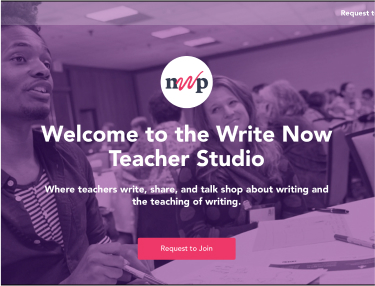Discover Content
Results for “Narrative”
Foster a "culture of creativity" with these 826 Digital Resources
This holiday season, explore curated lessons from 826 Digital that spark creativity in young writers and their teachers.
Write Time with Peter Kahn, Natalie Richardson, Christian "Rich Robbins" Robinson, and Poet t.l. sanders
This special poetry edition of The Write Time features educator/author/poet Peter Kahn along with special guests Natalie Rose Richardson, Rich Robbins, and Poet t.l. sanders.
From Notebook to Video: A Journey
Sally Griffin found that ever evolving technology gives students choices in how to tell their stories, supporting them in weaving a rich fabric of who they are. Here, she shares varied and moving examples of student work.
Video and Writing in the Elementary Grades
Chuck Jurich focuses on the writing that happens in video production as he describes how his elementary grade students become filmmakers in their Video Club. He includes an example of a student-produced script along with a description of the production process and how that process reflects…
Using Media to (Re) Claim The Hood: Essential Questions & Powerful English Pedagogy
Danielle Filipiak shares how she uses digital media tools and three essential questions to enable students to have a humanizing experience with writing and literacy. Included here are detailed activities, transcripts of classroom brainstorming sessions, and many examples of student work.
Amplifying Student Voices
Dave Boardman makes the argument that writing online not only makes writing digital, it transforms it into interactive, changeable communication. He tells the story of inviting his students to participate in an online community with other writers across the country and includes references…
Modernizing the Old School Essay
How can we rethink writing instruction to support students in writing authentic pieces about real world issues that matter to them? How can we move beyond the "old school essay" and invite students to write compositions that reflect what we see in real world writing? In Real Writing:…
Narrative Knowers, Expository Knowledge: Discourse as Dialectic
DiPardo addresses the divide between narrative and expository writing, noting the problematic tendency in composition teaching and scholarship to privilege "pure" exposition. She argues that instruction which fosters this divide, which contends narrative and expository are separate modes,…
Planning for Writing Instruction
In this brief tip from his book, When Writing Workshop Isn't Working, Mark Overmeyer describes a process of collaborative backward planning that provides a scope and sequence for the year that meets district curriculum requirements, allows for the study of genres connected to various…
Linking Genre to Standards and Equity
Here is an important article that offers a framework and looks at how genre studies can help writing teachers design meaningful and engaging writing instruction. Fox suggests that standards-based writing curricula do not go far enough when we only teach students about how various genres…
Radical Revision Strategies: My Road from Fairy Tale to Catharsis
A teacher-writer shares her experience using “radical revision,” a strategy for taking one’s writing apart and reassembling it. In the process of illustrating the impact of trying out various revisions of a poignant poem she wrote and shared with a writing group, she includes five clear and…
Helping High School Students “Gear Up” for College
This article highlights a program designed to support 9th graders in understanding how to differentiate and act upon revision and editing concerns. The program's development and implementation reflects a collaboration between area high school writing centers, teachers, and university…
Write Now Teacher Studio

Where teachers write, share, and talk shop about writing and the teaching of writing
Hosted by the National Writing Project, the Write Now Teacher Studio is an open, online community of educators for educators. It’s a place to write together, examine our teaching, create and refine curricula, and work toward ever more effective and equitable practices to create confident, creative, and critical thinkers and writers in our classrooms and courses.

